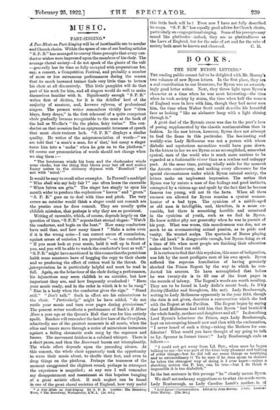MUSIC.
PART-SINGING.*
A Few Hints on Part-Singing will be of inestimable use to secular and Church choir& Within the space of one of our leading articles " S. P. B." has managed to convey those precepts that every con-
duotor wishes were impressed upon thamembers of his choir. The average choral society—I do not speak of the giants of the cult —generally has its time so fully occupied with preparations far, say, a concert, a Competition Festival, and probably a number of more or less extraneous performances during the season that its much harassed trainer finds very little time to lecture his choir at all discursively. This little pamphlet will do that part of his work for him, and all singers would do well to make themselves familiar with it. Significantly enough "S. P. B." 'writes first of diction, for it is the Achilles' heel of the
majority of amateur, and, horresco referen.s, of professional singers. The present writer remembers vividly how " Orra
blays, ferry drays," in the first rehearsal of a quite competent choir gradually 'became recognizable to the man at the book of the hall as Weelke's "On the plains, fairy trains." The con- ductor on that occasion had an epigrammatic terseness of speech that 'most choir-trainers lack. "S. P. B." displays a similar quality. He writes of the mispronunciation of words—" we are told that 'a man's a man, for a' that,' but many a singer ,turns him into a mahn ' when he gets on to the platform." Of course our pronunciation of words should not change when we sing them :—
" The huntsman winds his horn and the clookmaker winds your clocks, but the thing that blows your hat off and makes funny -noises in the chimney rhymes with Rosalind ' and not -with ' mind.' "
It would be easy to recall other examples. In Pearsall's madrigal " Who .shall win my lady fair 1" one often hears the execrable "'When hilves are grin." The -singer has simply to open his mouth wider to produce the euphonious " leaves " and "green."
"S. P. B." goes on to deal with time and pitch. The very errors an outsider would think a singer could not commit are
-the precise ones he does commit. They are usually quite childish mistakes, that perhaps is why they are so persistent. Writing of ensemble, which, of course, depends largely on the
question of time, "S. P.I3." repeats that eternal slogan: "Watch the conductor, and begin on the beat." How many conductors 'have said that, and how many times 7 "Make a noise even if it is the wrong noise—I can correct errors of commission, against errors of omission I am powerless "—so the conductor. "If you must look at your music, hold it well up in front of you, and you will be able to watch the conductor's beat as well." "S. P. B." might have mentioned in this connection the pernicious habit some amateurs have of hugging the copy to their chests and so producing the effect of cotton wool in the throat. On „interpretation he is particularly helpful and must be read in full. Again, on the behaviour of the choir during a performance, his injunctions may seem childish to an outsider, but how timportant they are, and how frequently overlooked ! "Have
your music ready, and in the order in which it is to be sung." "-Rise in a body when the conductor gives the sign." "Stand still." "Don't talk." Such in effect are his exhortations to the choir. "Particularly," might he have added, "do not rustle your musk and turn over pages during pianissimos." The present writer recollects a performance of Bach's B Minor .Mass a year ago at the Queen's Hall that was for him entirely spoilt. Readers will remember the last five bars of the Crucifizus, admittedly one of the _greatest moments in all music, when the
altos and tenors move through a series of miraculous harmonies -against a falling chromatic scale sung by the sopranos and basses. The movement finishes in a subdued whisper. There is
&short pause, and then the Besurrexit bursts out triumphantly.
The whole effect depends upon the preceding silence. At this concert, the whole choir apparently took the opportunity to wave their music about, to shuffle their feet, and even to
_drop things on the platform. Perhaps the tenseness of the moment exaggerated the slightest sound, perhaps in retrospect the experience is magnified ; at any rate I well remember my disappointment and resentment at this hopeless bungling
-of a great artistio effect. If such neglect can be found in one of the great choral societies of England, how very useful
• 5 &sup iHiids on Part-Singing. By S. P. B. London: The Broadway Press, 6 The Broadway, Westminster, 8.W.1. Us. =Li
this little book will be I 'Even now I have not fully described its scope. "S. P. B." has equally good advice for Church choirs, particularly on congregational singing. Some of his precepts may sound like platitudes—indeed, they are as platitudinous as the Laws of England, but for the sake of art and for the sake of society both met be known and observed. C. H.


































 Previous page
Previous page